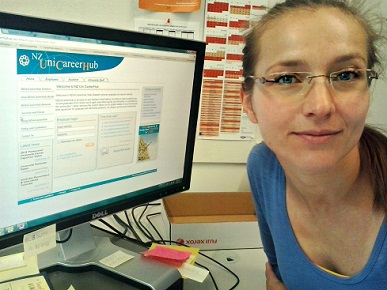Playing the interview game
Congratulations to Ewa Kusmierczyk to be awarded a PhD in Applied Linguistics.
(From VicNews 10 Dec 2013)
Victoria University graduand Ewa Kusmierczyk has discovered the key to success in job interviews—and it's more than just what you say, or how you say it.

She says it's all about the small things which help to develop trust between the interviewer and the candidate, and which are often taken for granted.
Ewa, who will graduate in December 2013 with a PhD in Applied Linguistics, studied 18 recorded interviews in minute detail, observing how speech, gaze, gesture, and documents are used to negotiate a shared understanding of what is required as an answer. This process, she says, relies on using multiple channels of communication.
"The candidate has limited time to pick up on the signals, and any misinterpretation can be taken as a reflection of incompetence."
For example, when an interviewer points to a candidate's CV while asking a question, this is likely to be a signal that specific information or a specific example is expected.
The candidate will meet this expectation if they make a direct reference to a particular experience in the CV.
Ewa says actions that accompany speech, such as gesture, have an important role to play, especially when things are not going well.
Gestures can carry information that is not expressed in speech. Mimicking the other person's gestures and speech in particular helps link the interpretations and create a feeling of understanding.
"Because the interviewer typically holds the power, some candidates can feel at a disadvantage. This is particularly relevant where skilled migrants, and especially non-native speakers, are competing against New Zealanders."
Ewa gathered data from mock interviews with graduate students and by working with an international recruitment agency which allowed her to video real interviews.
In addition to showing her how trust is built up, close to 30 hours of data uncovered a feature relevant to interviews in New Zealand—the so-called "tall poppy syndrome".
"Candidates are obviously expected to present themselves as positively as they can but there is an implicit expectation that they will soften their self-promotion," says Ewa.
Softening strategies include humorous comments, story-telling, or using intonation, gaze and gesture to engage the interviewer.
Ewa is putting her knowledge into practice by working for NZUniCareerHub—an initiative involving career services at seven New Zealand universities which matches graduates and employers.
Longer term she hopes to find work helping organisations to look at the way they think about, and approach, interviews. "Bad employment choice is a costly business," she says.
